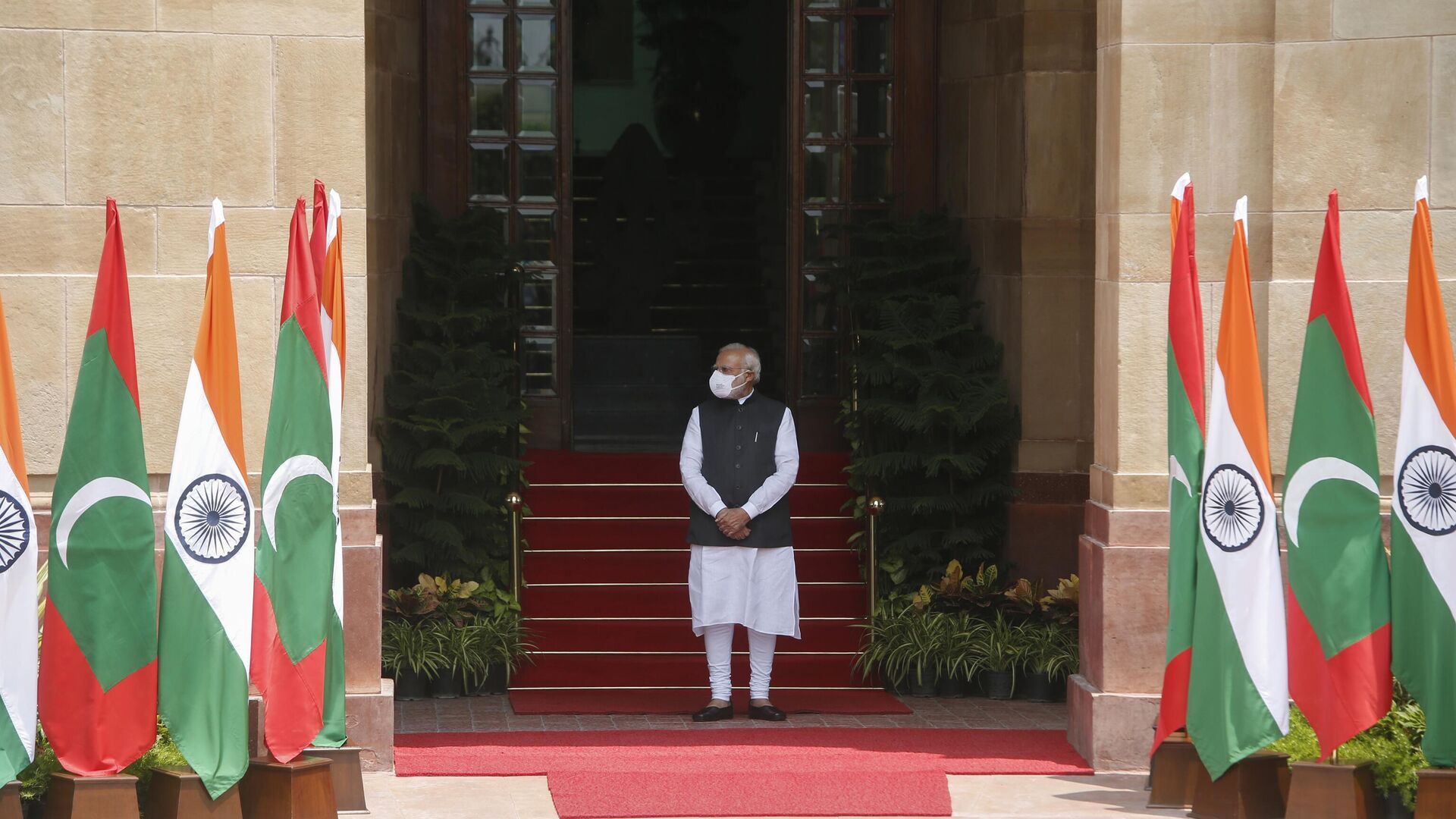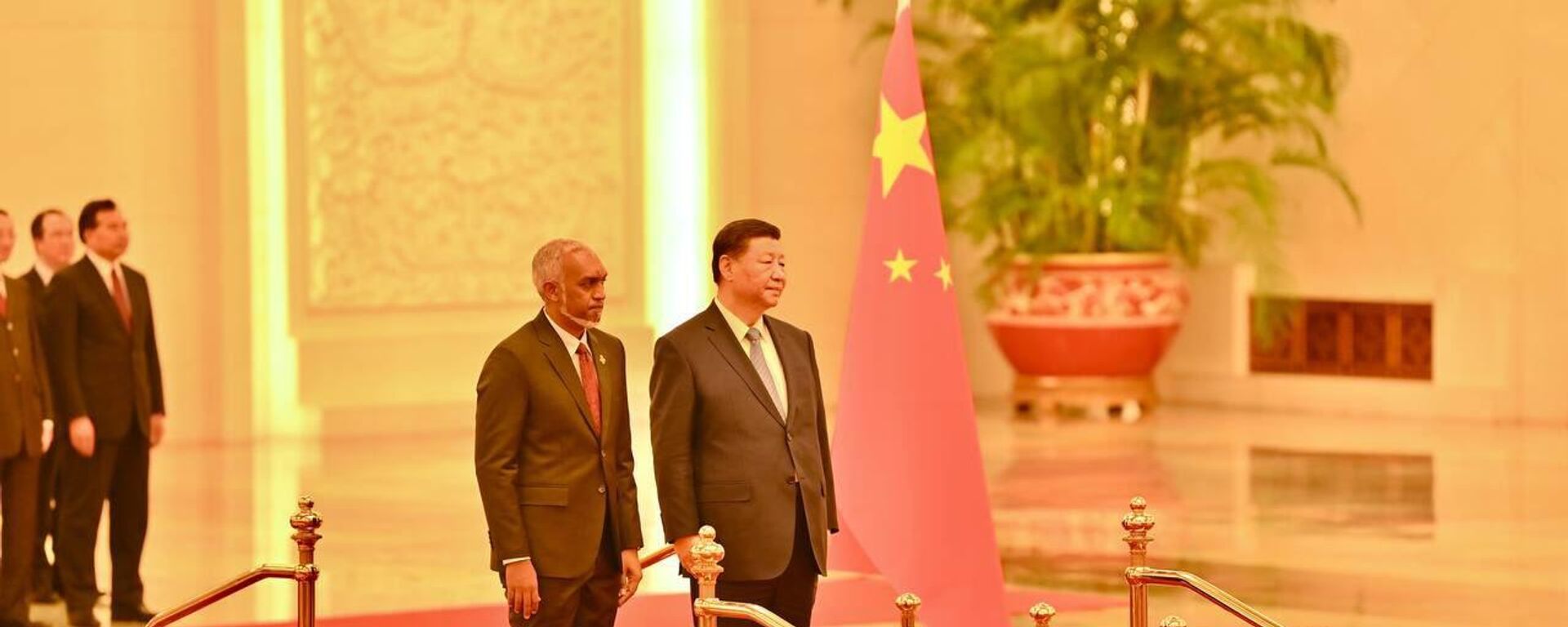https://sputniknews.in/20240111/who-benefits-from-india-maldives-row-6164108.html
Who Benefits From India-Maldives Row?
Who Benefits From India-Maldives Row?
Sputnik India
Maldives and China have signed 20 "key" pacts, including in disaster management, fisheries and tourism, after the talks between President Mohamed Muizzu and President Xi Jinping in Beijing on Wednesday.
2024-01-11T17:55+0530
2024-01-11T17:55+0530
2024-01-11T18:05+0530
sputnik opinion
india
maldives
china
indian navy
xi jinping
narendra modi
ministry of external affairs (mea)
indian ocean
arabian sea
https://cdn1.img.sputniknews.in/img/07e8/01/0b/6166471_0:160:3072:1888_1920x0_80_0_0_868e8453c8344b6b9e27ed62126d2d07.jpg
A China-Maldives joint press communique released on Thursday said that Maldivian President Mohamed Muizzu and President Xi Jinping reached an "extensive consensus" on bilateral as well as multilateral issues of interest, including on strengthening cooperation in Beijing-backed infrastructure and security frameworks such Belt and Road Initiative (BRI) and the Global Security Initiative (GSI).Muizzu conveyed to Prime Minister Narendra Modi during a meeting in Dubai last month that he wanted 75-odd Indian military personnel engaged in humanitarian and disaster relief (HADR) operations to leave the country.What Drives Muizzu's Geopolitical Shift?Dr Anand Kumar, an Associate Fellow at New Delhi-based think tank Manohar Parrikar Institute for Defence Studies and Analyses (MP-IDSA), told Sputnik India that Muizzu was "trying to minimize" India's role in the Maldives.Kumar noted that Muizzu had also paid a visit to China in 2022, a year before the presidential election. "During the visit, Muizzu had assured China that they would script a new chapter in the Maldives-China relationship if he were voted to power", he said.During Yameen's tenure between 2013 and 2018, Maldives signed on the BRI, leading to Chinese companies carrying out infrastructure works to the tune of several billion dollars. Yameen's successor Maldivian Democratic Party (MDP) came to power in 2018, which altered the foreign policy by announcing an 'India First' policy.Kumar echoed New Delhi’s official line that any development with a potential to impact or change the “security dynamics” of the Indian Ocean Region affected India.How do Maldives-China Ties Affect Indian Ocean Geopolitics?Commodore Seshadri Vasan (Retd), the Director General of Chennai Centre for Chinese Studies (C3S) and an Indian Navy veteran, said that Maldives-China pacts could eventually lead to Chinese presence in the Maldives.Vasan explained that the Indian Navy has traditionally been at the forefront of sea control, sea denial and HADR activities in the IOR. "This role could get a little more complicated due to the presence of an extra-regional player like China, which is not a littoral Indian Ocean state," he said.What are India’s Options?Vasan also stated that India has “no choice” but to step up New Delhi’s defence engagements with other Indian Ocean states, including Sri Lanka, Mauritius, Seychelles or Mozambique, under mechanisms such as Colombo Security Conclave (CSC) and the Indian Ocean Rim Association (IORA).
https://sputniknews.in/20240110/maldives-china-sign-action-plan-to-build-comprehensive-strategic-partnership-6154466.html
india
maldives
china
indian ocean
arabian sea
indo-pacific
us
sri lanka
Sputnik India
feedback.hindi@sputniknews.com
+74956456601
MIA „Rossiya Segodnya“
2024
Dhairya Maheshwari
https://cdn1.img.sputniknews.in/img/07e6/0c/13/138962_0:0:641:640_100x100_80_0_0_2cb44360dbcdf6d84bf4b299cd045917.jpg
Dhairya Maheshwari
https://cdn1.img.sputniknews.in/img/07e6/0c/13/138962_0:0:641:640_100x100_80_0_0_2cb44360dbcdf6d84bf4b299cd045917.jpg
News
en_IN
Sputnik India
feedback.hindi@sputniknews.com
+74956456601
MIA „Rossiya Segodnya“
Sputnik India
feedback.hindi@sputniknews.com
+74956456601
MIA „Rossiya Segodnya“
Dhairya Maheshwari
https://cdn1.img.sputniknews.in/img/07e6/0c/13/138962_0:0:641:640_100x100_80_0_0_2cb44360dbcdf6d84bf4b299cd045917.jpg
maldives controversy, maldives india, maldives news, modi news, modi in lakshadweep, muizzu china, muizzu india, muizzu maldives, muizzu xi jinping, muizzu and modi, modi maldives matter, india out
maldives controversy, maldives india, maldives news, modi news, modi in lakshadweep, muizzu china, muizzu india, muizzu maldives, muizzu xi jinping, muizzu and modi, modi maldives matter, india out
Who Benefits From India-Maldives Row?
17:55 11.01.2024 (Updated: 18:05 11.01.2024) Maldives and China have signed 20 "key pacts", including in disaster management, fisheries and tourism, after the talks between President Mohamed Muizzu and President Xi Jinping in Beijing on Wednesday.
A China-Maldives joint press communique released on Thursday said that Maldivian President Mohamed Muizzu and President Xi Jinping reached an "extensive consensus" on bilateral as well as multilateral issues of interest, including on strengthening cooperation in Beijing-backed infrastructure and security frameworks such Belt and Road Initiative (BRI) and the Global Security Initiative (GSI).
Indian experts have told Sputnik India that Muizzu's state-level visit to China has given clear indications that the new Maldivian administration was seeking to "replace the role of New Delhi in the country with Beijing".
Muizzu conveyed to
Prime Minister Narendra Modi during a meeting in Dubai last month that he wanted 75-odd Indian military personnel engaged in humanitarian and disaster relief (HADR) operations to leave the country.
What Drives Muizzu's Geopolitical Shift?
Dr Anand Kumar, an Associate Fellow at New Delhi-based think tank Manohar Parrikar Institute for Defence Studies and Analyses (MP-IDSA), told Sputnik India that Muizzu was "trying to minimize" India's role in the Maldives.
"So, one could say that his efforts are in the direction of trying to replace India with China," Kumar said.
Explaining the shift in Maldivian foreign policy since Muizzu assumed the presidency, the expert recalled that Muizzu has never made a secret of pro-China leanings.
Kumar noted that Muizzu had also paid a visit to China in 2022, a year before the presidential election. "During the visit, Muizzu had assured China that they would script a new chapter in the Maldives-China relationship if he were voted to power", he said.
The Indian expert said that Muizzu's ongoing tilt to deepen ties with China were just a "continuation" of the policies adopted by the Yameen administration. "What is happening the Maldives-China relationship is on the expected lines," Kumar stated.
During
Yameen's tenure between 2013 and 2018, Maldives signed on the BRI, leading to Chinese companies carrying out infrastructure works to the tune of several billion dollars. Yameen's successor
Maldivian Democratic Party (MDP) came to power in 2018, which altered the foreign policy by announcing an 'India First' policy.
Kumar echoed New Delhi’s official line that any development with a potential to impact or change the “security dynamics” of the Indian Ocean Region affected India.
How do Maldives-China Ties Affect Indian Ocean Geopolitics?
Commodore Seshadri Vasan (Retd), the Director General of Chennai Centre for Chinese Studies (C3S) and an Indian Navy veteran, said that Maldives-China pacts could eventually lead to Chinese presence in the Maldives.
“It is likely that certain number of Chinese military personnel could be stationed in the Maldives’ Exclusive Economic Zone (EEZ) to assist them in HADR operations, fisheries, blue economy and other activities. Till now, these activities have been carried out with Indian assistance,” Vasan said.
Vasan explained that the Indian Navy has
traditionally been at the forefront of sea control, sea denial and HADR activities in the IOR.
"This role could get a little more complicated due to the presence of an extra-regional player like China, which is not a littoral Indian Ocean state," he said.
At the same time, the Indian Navy veteran cautioned against the growing presence of other “extra-regional powers” such as the US in the Indian Ocean. “India has been clear that it wouldn’t like to join any camp. India also possesses the desired naval capabilities to tackle any challenges arising in the Indian Ocean,” Vasan said.
What are India’s Options?
Vasan suggested that India will have to work at all levels—intergovernmental, economic, people-to-people, to ensure that it continues to be the country of choice—to ensure its re-gains its strategic primacy in the Maldives.
"India needs to work with the Maldivian opposition as well as with the people of Maldives to regain the trust that we seemed to have lost in certain sections. India must be wary of alienating the Maldivian population because people-to-people contacts are what would ultimately define the future of India-Maldives relations,” the expert said.
Vasan also stated that India has “no choice” but to step up New Delhi’s defence engagements with other Indian Ocean states, including Sri Lanka, Mauritius, Seychelles or Mozambique, under mechanisms such as Colombo Security Conclave (CSC) and the Indian Ocean Rim Association (IORA).
"Sri Lanka has started to appreciate India's security concerns in a big way now since New Delhi supported it with financial assistance to the tune of $4 billion during the economic crisis," Vasan asserted.
And, while countries such as Mauritius and Seychelles have their own political dynamics, they are within the scope of Indian Navy's Maritime Domain Awareness (MDA) programme,” he concluded.



